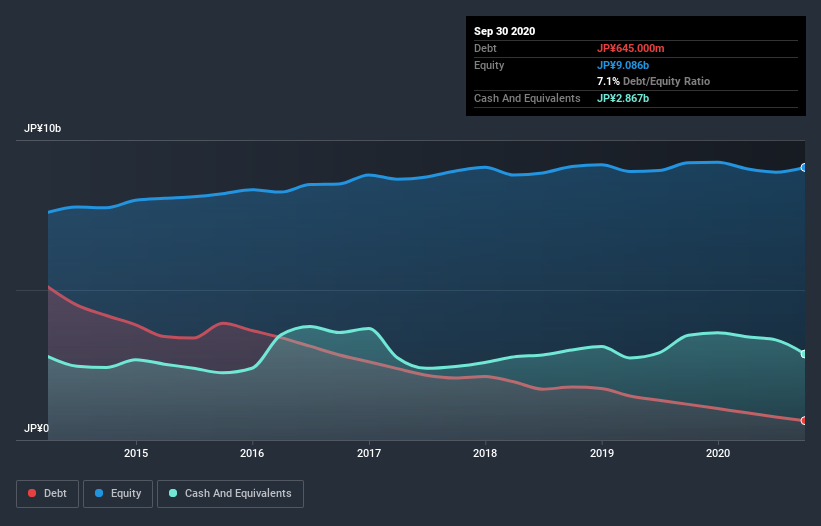
Howard Marks put it nicely when he said that, rather than worrying about share price volatility, 'The possibility of permanent loss is the risk I worry about... and every practical investor I know worries about.' When we think about how risky a company is, we always like to look at its use of debt, since debt overload can lead to ruin. As with many other companies Cocolonet CO., LTD. (TYO:6060) makes use of debt. But the more important question is: how much risk is that debt creating?
What Risk Does Debt Bring?
Debt and other liabilities become risky for a business when it cannot easily fulfill those obligations, either with free cash flow or by raising capital at an attractive price. In the worst case scenario, a company can go bankrupt if it cannot pay its creditors. However, a more common (but still painful) scenario is that it has to raise new equity capital at a low price, thus permanently diluting shareholders. By replacing dilution, though, debt can be an extremely good tool for businesses that need capital to invest in growth at high rates of return. The first step when considering a company's debt levels is to consider its cash and debt together.
View our latest analysis for Cocolonet
What Is Cocolonet's Net Debt?
The image below, which you can click on for greater detail, shows that Cocolonet had debt of JP¥641.0m at the end of September 2020, a reduction from JP¥1.19b over a year. But on the other hand it also has JP¥2.87b in cash, leading to a JP¥2.23b net cash position.

How Strong Is Cocolonet's Balance Sheet?
We can see from the most recent balance sheet that Cocolonet had liabilities of JP¥1.23b falling due within a year, and liabilities of JP¥9.45b due beyond that. Offsetting these obligations, it had cash of JP¥2.87b as well as receivables valued at JP¥275.0m due within 12 months. So its liabilities total JP¥7.54b more than the combination of its cash and short-term receivables.
The deficiency here weighs heavily on the JP¥3.24b company itself, as if a child were struggling under the weight of an enormous back-pack full of books, his sports gear, and a trumpet. So we'd watch its balance sheet closely, without a doubt. At the end of the day, Cocolonet would probably need a major re-capitalization if its creditors were to demand repayment. Cocolonet boasts net cash, so it's fair to say it does not have a heavy debt load, even if it does have very significant liabilities, in total.
It is just as well that Cocolonet's load is not too heavy, because its EBIT was down 81% over the last year. Falling earnings (if the trend continues) could eventually make even modest debt quite risky. When analysing debt levels, the balance sheet is the obvious place to start. But it is Cocolonet's earnings that will influence how the balance sheet holds up in the future. So when considering debt, it's definitely worth looking at the earnings trend. Click here for an interactive snapshot.
Finally, while the tax-man may adore accounting profits, lenders only accept cold hard cash. Cocolonet may have net cash on the balance sheet, but it is still interesting to look at how well the business converts its earnings before interest and tax (EBIT) to free cash flow, because that will influence both its need for, and its capacity to manage debt. Happily for any shareholders, Cocolonet actually produced more free cash flow than EBIT over the last three years. That sort of strong cash generation warms our hearts like a puppy in a bumblebee suit.
Summing up
While Cocolonet does have more liabilities than liquid assets, it also has net cash of JP¥2.23b. The cherry on top was that in converted 137% of that EBIT to free cash flow, bringing in JP¥168m. Despite the cash, we do find Cocolonet's level of total liabilities concerning, so we're not particularly comfortable with the stock. When analysing debt levels, the balance sheet is the obvious place to start. But ultimately, every company can contain risks that exist outside of the balance sheet. Take risks, for example - Cocolonet has 3 warning signs (and 1 which is potentially serious) we think you should know about.
Of course, if you're the type of investor who prefers buying stocks without the burden of debt, then don't hesitate to discover our exclusive list of net cash growth stocks, today.
If you’re looking to trade Cocolonet, open an account with the lowest-cost* platform trusted by professionals, Interactive Brokers. Their clients from over 200 countries and territories trade stocks, options, futures, forex, bonds and funds worldwide from a single integrated account. Promoted
New: AI Stock Screener & Alerts
Our new AI Stock Screener scans the market every day to uncover opportunities.
• Dividend Powerhouses (3%+ Yield)
• Undervalued Small Caps with Insider Buying
• High growth Tech and AI Companies
Or build your own from over 50 metrics.
This article by Simply Wall St is general in nature. It does not constitute a recommendation to buy or sell any stock, and does not take account of your objectives, or your financial situation. We aim to bring you long-term focused analysis driven by fundamental data. Note that our analysis may not factor in the latest price-sensitive company announcements or qualitative material. Simply Wall St has no position in any stocks mentioned.
*Interactive Brokers Rated Lowest Cost Broker by StockBrokers.com Annual Online Review 2020
Have feedback on this article? Concerned about the content? Get in touch with us directly. Alternatively, email editorial-team (at) simplywallst.com.
About TSE:6060
Excellent balance sheet, good value and pays a dividend.
Market Insights
Community Narratives




